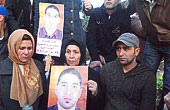Tunisia: Regueb sustains mobilisation

As Barack Obama and William Hague offer very different kinds of support and different visions for Tunisia's future, trade unionists and human rights activists in the region have called for international solidarity, writes Amanda Sebestyen.
Since the Tunisian dictator Ben Ali was ousted by mass unarmed demonstrations, successive waves of protest and self-organisation have dismantled many of the old structures of that dictatorship. Earlier this month the old regime showed that it could strike back. The prospect of a coup plot by the old dictator's party (which had 1 million members) to take over the country after July's elections led to further demonstrations in May. This time protesters were beaten and journalists – male and female – singled out for disabling attacks. It emerged that a censorship law had been secretly rushed through by the interim government. News from the Tunisian heartland, which started the democratic revolution, is not getting through, even inside the country.
‘La Tunisie profonde’ is the interior where the uprisings began. The revolution in Tunisia is seen as bloodless, but not when you reach small towns where almost everyone knows someone who died, and almost everyone marched and organised against the regime. Since then they have been setting up their own local councils, been central participants in the independent trade unions, made organisations for the graduate unemployed whose plight kicked off the uprising, held women's marches and begun court proceedings to prosecute the snipers who killed young men and women demonstrators.
Regueb, with just 7,000 inhabitants, is one of the most fully mobilised places. High on a hill outside the town is a message in Arabic spelled out in white stones: 'Welcome to Regueb, the land of free people'. Its tiny trade union hall is filled with the spirit of early trade unionism. Hand-painted portraits of past labour heroes flank the image of linked hands inside a red crescent, logo of the UGTT or General Union of Tunisian Workers. Over the ceiling and walls are dotted more recent CGI collages inspired by the youth uprisings.
In February Regueb women from all ages and backgrounds filled the streets under banners spelling 'Je suis femme, ne touche pas ma liberté'. In April Regueb's citizens came together and created a new town council to represent them in this dangerous gap between the fall of the old dictatorship in January and contested new elections in July.
Mohamed Abidi is a schools inspector from Regueb, whose son Chady used his graduate IT skills to organise and publicise the resistance. When Chady went to the streets, 'armed with nothing but his voice', he was shot and paralysed by a police sniper. Mohamed Abidi sent a bulletin this week, with a call for 'papers in London to know about the latest events in our town if possible'.
'On Tuesday morning a delegation of representatives of the inhabitants of Regueb attended a meeting in the provincial governorate of Sidi Bouzid [the nearby city which sparked off the Arab revolutions after the death of street trader Mohamed Bouzizi">.
'Several ministers oversaw the meeting: the ministers of regional development, of health, of social affairs and higher education.
'Given the fact that not one developmental project, or health or industrial project, is being brought to the town of Regueb, the representatives have called for a popular peaceful demonstration in the streets of the town followed by an information meeting.
'The inhabitants of Regueb have decided that their town will be independent from the governorate of Sidi Bouzid till the government satisfies the urgent needs of the area:
- A regional hospital for the population of 73,000
- A local covered market square for the fruits and vegetables produced in Regueb
- The removal from power of all the groups of people connected to the regime of Ben Ali.'
This last demand remains critical. Many of the former officials and security apparatus remain in place until at least the election. With waves of returning migrants from Libya and continuing mass unemployment, Regueb and its sister towns are making heroic efforts for a peaceful, democratic and popular transition. They need twinning, trade union solidarity actions and to keep communications open.
They can be contacted via: amseb[at">blueyonder.co.uk
Often these towns feel they have been left alone. In the words of Taoufik Ben Abdallah of the Tunisian League of Human Rights: 'The people who made the revolution are waiting for an answer and getting none. There is a vital need for justice for the killed and injured; for work, salaries, enterprises; there are so many social injustices and such a lack of security, with the people confronted by vengeful police. We need to bring this message back forcefully to Tunis.’ And Britain.
One way for voices of the Tunisian revolution to reach us is to help them build their own community media, not subject to the mainstream globalising agenda. The unemployed graduate association Elkarama is asking for international support from journalists to set up a community radio station, and to donate computers and office equipment. For contact emails, get in touch on amseb[at">blueyonder.co.uk.
BROUGHT TO YOU BY PAMBAZUKA NEWS
* Please send comments to editor[at">pambazuka.org or comment online at Pambazuka News.
